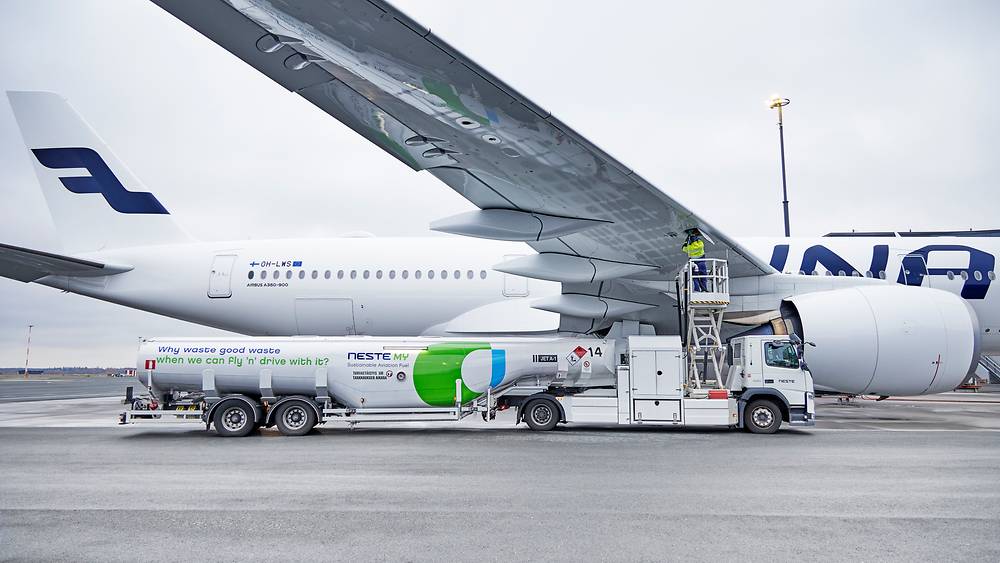Cargo news


SAF to lower aviation emissions
Sustainable aviation fuel or SAF is currently the best option for decreasing emissions in aviation. Legislative changes in the EU and the rest of the world steer towards increased use of SAF, but everyone in the value chain should contribute to the progress to make a greater impact.
SAF is an alternative fuel made from renewable resources like used cooking oil, agricultural waste, municipal solid waste, algae, or even captured carbon. It can be blended with traditional jet fuel and used in existing aircraft engines without modifications.
Finnair aims to increase the use of SAF in the coming years to meet the company’s new science-based climate target to improve emission efficiency (CO2e/RTK) by 34.5 per cent by 2033, with 2023 as the baseline year. The plan is to use more SAF than the current regulation requires.
In recent years Finnair has gradually increased its use of SAF annually.
- The use of SAF is currently the most efficient tool for emission reduction we have. It has smaller life cycle emissions in comparison to fossil jet fuel and therefore it directly reduces emissions, instead of being a compensation method, Finnair’s Head of Environment Tuomo Karppinen says.
The current regulative framework for SAF is multifaceted, and the progress to support the use of SAF is happening at different time scales around the world.
In the EU the ReFuel regulation took effect at the start of the year 2025, setting a mandate that 2 per cent of fuel used in major European airports must be SAF. The requirement goes up to 6 per cent by 2030.
The airlines will now also face an anti-tankering demand, meaning that the requirement to use SAF cannot be avoided by carrying fuel from smaller airports. Even the legislation for emissions trading is becoming considerably stricter.
- Even though the regulative playing field is progressing, it would be irresponsible for the air transport industry to wait for legislators to set the standards in an urgent situation, Karppinen notes.
Shared efforts are crucial
At Finnair, the focus is now to make sure everyone in the value chain understands the potential of utilizing SAF and the shared responsibility for lowering emissions.
- As well as our climate targets, we also keep in mind that our clients also have their own environmental targets and incentives. This makes it even more relevant to work together so that the entire value chain can decrease emissions, Finnair’s Senior Sustainability Manager Tarja Koski points out.
Due to the higher price of this alternative fuel, it is important to enable customer contributions to share the increased costs. Finnair is prepared to take responsibility for its part, but the only way to seriously increase the use of SAF is if the costs are approached by a co-funding principle.
- The benefits will multiply if everyone contributes and SAF should not be seen as a profit item, Finnair Cargo’s Sales and Sustainability Manager Janike Heimonen emphasizes.
Book & Claim your SAF
Finnair's goal now is to share the benefits of voluntary SAF-related emission reductions with its customers.
Cargo customers investing in SAF receive a verified emissions reduction certificate, and they can use the scope 3 reductions achieved by co-funding SAF in their climate reporting. Freight forwarders can resell emissions reductions to any shipper, unless a SAF batch is dedicated to a certain shipper.
The SAF emission reductions are sold on a Book&Claim principle. This is designed to facilitate the use of SAF in aviation without requiring physical delivery to a specific flight or location. This means that the SAF that customers co-fund might not be used to operate the flight of their specific shipment. It is, however, guaranteed that the bought quantity of SAF will be used for flights departing from airports within Finnair network.
- We as an airline purchase the SAF physically and ensure that it will be used at the allocated airport, Karppinen mentions.
The Book&Claim principle ensures that the use of SAF is not limited by logistical challenges, and at the same time, the companies funding it can fully claim the environmental benefits through certification.
Currently emissions reductions based on sustainable aviation fuel from Finnair are available in batches, in different sizes but Finnair Cargo is also looking at possible shipment level options to ensure we provide the options needed and support for our customers.
- We focus on offering a simple solution so that we can achieve a system-level change together with our clients. If you would like to hear more about how Book&Claim works or ensure your participation, you can book a meeting with us, Heimonen encourages.
For further information on SAF please visit Sustainable aviation fuel (SAF) | Finnair Cargo. By clicking the ‘Take action’ button on the SAF page you can to book a meeting with Finnair Cargo team to discuss more.